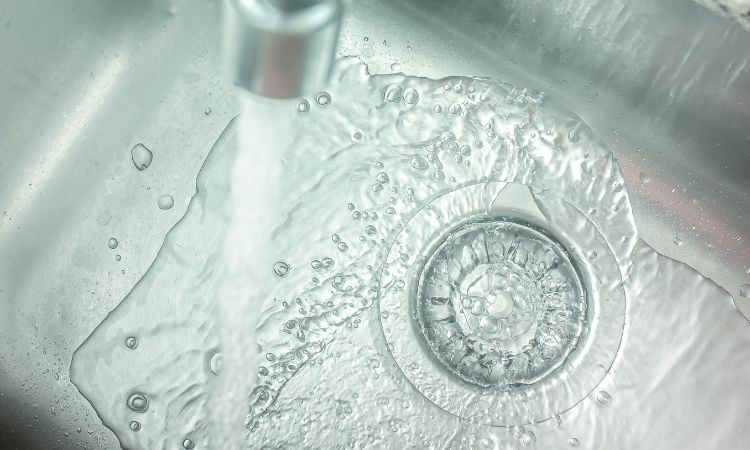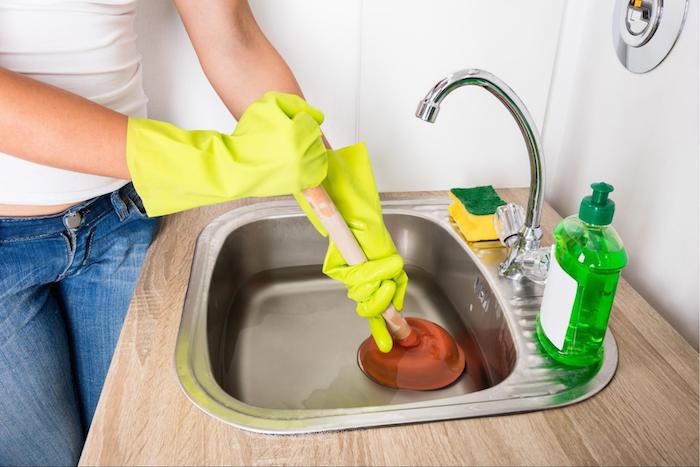Easy Ways To Fix A Slow-Draining Sink
Easy Ways To Fix A Slow-Draining Sink
Blog Article
Were you searching for resources on Three Common Ways to Fix a Slow Drain?

Intro
We've all existed: You're brushing your teeth or washing your hands, and you see the water merging in the sink. Instead of quickly swirling away, it lingers, transforming your once-refreshing morning routine right into a small swamp scene. A slow-draining sink isn't simply aggravating; it's typically an indication of larger plumbing issues hiding beneath the surface area. The bright side is that a lot of slow-draining sinks can be taken care of with a little expertise, a couple of standard tools, and some perseverance. Ready to tackle this project head-on? Let's roll up our sleeves and dive right in.
Comprehending the Sources Of a Slow-Draining Sink
Prior to you begin poking around in your pipelines, it assists to understand what may be triggering the downturn. Understanding the root cause makes it easier to pick the right fix.
Tools and Materials You'll Require
The right tools make all the difference. Luckily, you won't require a completely stocked plumber's van to finish the job.
Step-by-Step Guide to Fixing a Slow-Draining Sink
Currently, let's enter the nitty-gritty. This step-by-step process will certainly guide you with straightforward methods to recover your sink's drainage.
Step 1: Get Rid Of and Clean the Stopper
Frequently, the stopper (that small plug you lower to obstruct water) is the initial perpetrator. Remove it very carefully and wipe any hair or substance entraped around its base. Wash it thoroughly before putting it back in place.
Step 2: Use a Bettor to Displace Particles
Got that bettor prepared? Setting it over the drain and give it a few company pumps. The concept is to develop suction that can loosen any kind of clog. If you see littles particles drifting up, you're on the right track.
Action 3: Try a Drain Snake or Cord Hanger
If the bettor doesn't suffice, it's time to bring out the drainpipe serpent. Delicately feed it into the drain and twist as you go. You could feel some resistance-- that's likely the blockage. Keep turning and pulling up until you remove the blockage. If you don't have a drain serpent, a straightened cable wall mount can work in a pinch.
Tip 4: Apply a Do It Yourself Drain Cleaner
An all-natural cleaner made from baking soda and vinegar can break down recurring grime. Pour half a mug of cooking soda into the drain, adhered to by half a mug of vinegar. Allow it fizz for about 15 minutes, then flush with hot water. This chemical reaction usually does wonders for minor obstructions.
Tip 5: Rebuild and Examine the Sink
Put whatever back together and run the faucet. Does the water now swirl down the tubes at a respectable speed? If yes, give yourself a pat on the back. If not, don't despair-- there are still a few even more dress up your sleeve.
Essential Devices for Do It Yourself Fixes
A plunger is your go-to starting factor. A little, sink-sized plunger develops suction that can displace small blockages. For even more consistent blockages, a drain serpent (in some cases called a plumbing's auger) functions wonders. A set of handwear covers, a flashlight, and perhaps a set of protective goggles are additionally convenient.
Suggested Cleaning Solutions
Mild dish soap and warm water can help break down greasy accumulation. A combination of baking soda and vinegar is a reliable natural home remedy, and chemical cleansers supply a more eco-friendly method. Maintain chemical drainpipe cleaners as a last option, as they can be severe on your pipelines.
Common Wrongdoers Behind Slow Water Drainage
So, what's clogging points up? Normally, it's a mix of day-to-day debris-- believe hair, soap residue, tooth paste residue, and leftover food particles. Gradually, these tiny bits collect and hold on to the pipe walls, slowly tightening the passage and making it harder for water to go through. Sometimes, natural resource from tough water can additionally contribute to the substance, creating the perfect storm for persistent blockages.
When is it Time to Do Something About It?
If you observe the water draining slower than common, it's an excellent concept to step in sooner rather than later. Waiting as well long might cause finish blockages, unpleasant smells, or perhaps pipe damage. If the water takes greater than a few secs to clean out after switching off the tap, consider it a warning and prepare to place on your do it yourself hat.
Safety And Security First: Precautions and Prep work
Before you launch into unclogging setting, think of safety and security. You're taking care of possibly unclean water and debris, so slip on a pair of gloves. If you're utilizing chemical cleaners, guarantee the room is well-ventilated and follow the instructions on the tag.
Protective Gear and Work Space Arrangement
Put down some old towels or rags around the sink area to capture splashes. Clear away any items that may enter your method, like soap dispensers or tooth brush owners. Make certain you have good lights-- get a flashlight if required.
Alternative Approaches for Stubborn Clogs
Not all blockages are produced equivalent. If your sink still declines to coordinate, think about these different services.
Sodium Bicarbonate and Vinegar Method
We already discussed this, yet it deserves noting again. This gentle, environment-friendly approach is more secure than chemical cleansers and typically rather efficient.
Chemical Drainpipe Cleansers
Enzyme-based cleansers utilize natural germs to absorb organic matter. They're an exceptional option if you're looking to avoid extreme chemicals. Simply keep in mind, they might take a bit longer to function their magic.
Chemical Drainpipe Cleaning Company: Pros and Cons
Chemical cleansers can blast through hard blockages quickly, however they're not without disadvantages. They can produce heat and fumes, damages pipelines if made use of exceedingly, and posture ecological threats. Utilize them sparingly, and always comply with the directions meticulously.
Safety Nets to Maintain Your Sink Flowing
Prevention is the very best treatment. By taking on a couple of straightforward behaviors, you can maintain your sink from reducing to begin with.
Routine Cleansing Routines
Wipe down the sink container and fixture area on a regular basis. Remove hair or food bits prior to they have a possibility to wash down the drainpipe.
Staying Clear Of Damaging Substances Down The Tubes
Think twice before discarding coffee grounds, grease, or fibrous veggie scraps down the sink. These culprits cling to pipe wall surfaces, developing blockages over time.
Regular Upkeep Checks
Set up a fast monthly evaluation. Run warm water with the sink for a few mins, paying attention to the flow. If it appears slow-moving, act quickly prior to it comes to be a full-on blockage.
When to Call an Expert Plumbing
In some cases, no matter how tough you attempt, that clog simply won't budge. That's when it's time to generate the pros.
Indications That Suggest an Extra Severe Issue
If your sink drains pipes slowly regardless of multiple efforts, or if you discover water supporting in other fixtures (like your shower or bathroom), you might have an extra severe pipes issue prowling much deeper in the system.
Stabilizing Do It Yourself Initiatives with Specialist Help
While do it yourself can save you cash and offer a feeling of accomplishment, there's no pity in calling a specialist. A professional plumbing professional can assess your entire plumbing setup, making sure there's no underlying damages or long-term issue that might cost you a lot more in the future.
Contrasting Expenses and Long-Term Solutions
Before deciding, think about the big picture. A cheap, quick fix could solve the problem temporarily, but investing in a much more permanent service can conserve you cash and anxiety over time.
Considering the Expenditures of DIY vs. Professional Solutions
Do it yourself repairs usually set you back little more than the cost of a bettor or a container of baking soda. Expert services, on the other hand, included a cost yet might prevent repetitive concerns and pricey fixings later.
Investing in Quality Fixtures and Upgrades
If your sink's layout adds to regular clogs, it might be worth upgrading to higher-quality components or changing the plumbing format. Consider this a financial investment in your home's capability and comfort.
Verdict
A slow-draining sink can feel like a small irritability, yet it's typically an indication that your plumbing needs a little tender loving care. By comprehending the root causes, using the right devices and techniques, and dedicating to simple safety nets, you can maintain your sink flowing freely. And when all else falls short, never wait to call in a professional-- your home's plumbing deserves the investment in treatment and maintenance.
Three Common Ways to Fix a Slow Drain
Baking Soda Method
Boil a full pot of water. Measure out cup of baking soda and pour it down the drain. Then take cup of the magical cleansing substance known as white vinegar and drop that down there too. Allow the mixture to fizz in the drain for five minutes as the vinegar and baking soda combine. Now dump in that whole pot of boiling water. This combination of cleaning substances should clear out anything that is causing your sink to drain slowly. If it doesn t...
Zip-It
If the baking soda method doesn t clear out your drain, it may be because a significant amount of hair and/or other debris has collected there and you need to remove it. Purchase a Zip-It tool at any home improvement or hardware store and insert it into your drain. It will catch any collected hair or debris that s blocking the flow of water. Pull it out. If it s got a big clump of hair, etc. on the end, you ve probably got your culprit.
Drain Cleaner
If these methods don t work, there is the standard drain cleaner that you can also buy in a hardware store or even your local grocery store. It s better if you can use a household solution, but these drain cleaners often work in a pinch. They re very simple to use. You generally just dump them in your drain and wait. If even this method is not effective, it may be time to call the plumber.
https://www.mrrooter.com/oneida/about-us/blog/2017/july/three-common-ways-to-fix-a-slow-drain/

I discovered that blog entry on Solved! How to Fix a Slow Sink Drain while doing a search on the internet. Sharing is caring. One never knows, you may be helping someone out. Thank you for your time. Please come visit our site back soon.
Call Us Today Report this page